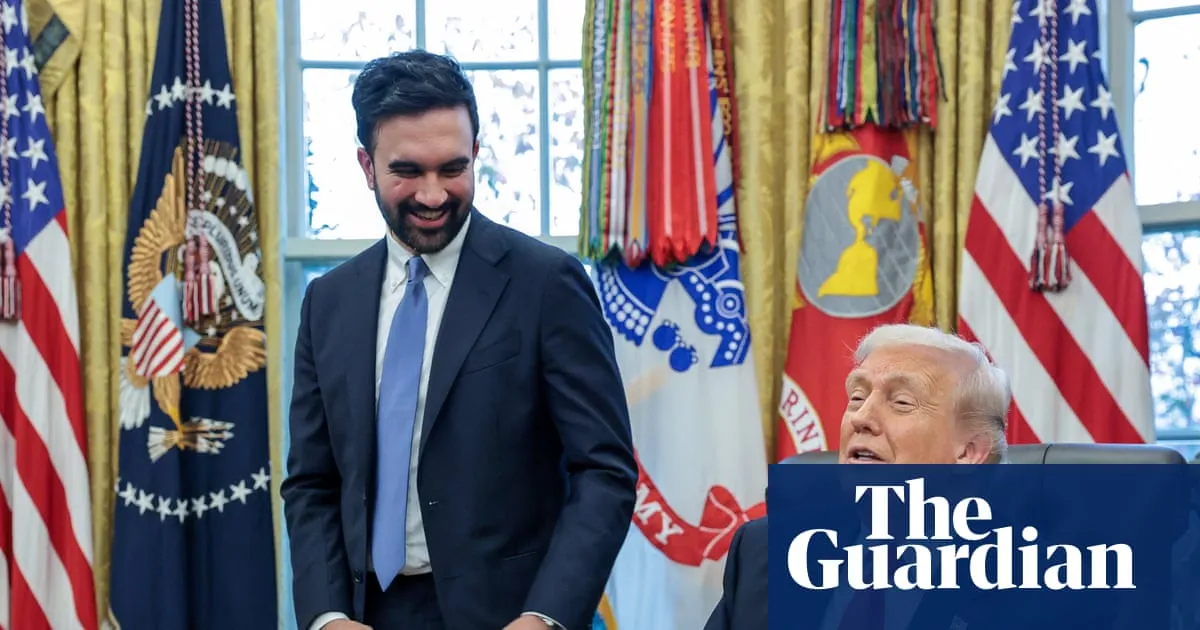
The political landscape in America often seems divided into two opposing camps: lefty America and the MAGA movement. Recently, a surprising meeting took place that challenged these traditional binaries, as Donald Trump and Zohran Mamdani, the incoming Democratic Socialist mayor of New York, came together in the Oval Office. Trump, a seasoned political figure at 79 years old, previously labeled Mamdani a “100% Communist Lunatic” and “total nut job.” In contrast, Mamdani referred to Trump as a “despot” and “fascist.” However, what unfolded during their meeting was far from a typical political showdown.
Instead of the anticipated confrontation, Trump and Mamdani demonstrated an unexpected camaraderie. The interaction resembled a scene from Toy Story, with Trump playing the role of Woody and Mamdani as Buzz Lightyear. This unlikely bonding raises questions about whether the old left vs. right narrative is fading. In fact, Trump appears to have a more amicable relationship with Mamdani than with some of his own Republican allies, such as Marjorie Taylor Greene.
During their meeting, Trump sat at the Resolute Desk while Mamdani stood beside him, a statue of George Washington looming in the background. “We have one thing in common – we want this city of ours that we love to do very well,” Trump stated, referring to New York City. He expressed optimism about Mamdani’s potential as mayor, saying, “The better he does – the happier I am.” This statement left White House reporters stunned and led Republican strategists to reconsider their approach to Mamdani, who they had intended to portray as the extreme leftist face of the Democratic Party.
Mamdani, who will become New York's first Muslim mayor and has previously characterized Trump as “Donald Trump’s worst nightmare,” described their meeting as “productive” and focused on their mutual admiration for New York City. He emphasized the urgent need to address “affordability” for New Yorkers. Trump, acknowledging Mamdani's controversial ideas, predicted that he would “change” and “surprise some conservative people.” Both leaders recognized that some of Mamdani’s supporters also voted for Trump, primarily due to shared concerns over the cost of living.
When asked about his past remarks labeling Trump a despot, Mamdani skillfully redirected the conversation back to affordability. Trump, with a light-hearted response, said, “I’ve been called much worse than a despot, so it’s not that insulting.” This exchange highlights how political insults have evolved in today’s climate.
As the meeting progressed, Trump playfully interjected when a reporter inquired whether Mamdani stood by his previous comments about Trump’s fascist tendencies. “That’s OK. You can just say yes. OK?” Trump said, patting Mamdani affectionately on the arm. This moment, while amusing, raises concerns among historians about the implications of a sitting president casually dismissing such serious accusations.
Further into their discussion, when a reporter questioned Mamdani about his choice to fly to Washington instead of taking a more eco-friendly train, Trump defended him, highlighting the efficiency of air travel. The president also disagreed with Republican congresswoman Elise Stefanik’s characterization of Mamdani as “a jihadist,” calling him “a very rational person.”
The meeting marks a significant shift in Trump’s stance toward Mamdani, who Trump had previously threatened to penalize financially if he won the mayoral race. “I expect to be helping him, not hurting him,” Trump stated emphatically, underscoring his desire for New York City’s success.
When asked whether he would feel secure living in New York under Mamdani's administration, Trump replied with confidence, stating, “Yeah, I would, I really would.” He elaborated on their discussions about how Mamdani’s supporters had previously aligned with Trump, particularly during the 2016 election cycle when Bernie Sanders dropped out of the race. Trump noted, “Bernie Sanders and I agreed on much more than people thought,” suggesting a convergence between the far left and far right in opposing the political establishment.
This unexpected rapport between Trump and Mamdani highlights their shared discontent with the status quo and elite governance. While Trump’s economic populism may come into question due to his affluent lifestyle, his enthusiastic reception of Mamdani reflects a recognition of the political outsider’s appeal.
Ultimately, this meeting serves as a reminder that within the complex landscape of American politics, unexpected alliances can form, and traditional boundaries may begin to blur. As Trump and Mamdani foster their relationship, the implications for New York City and beyond could be both surprising and profound.